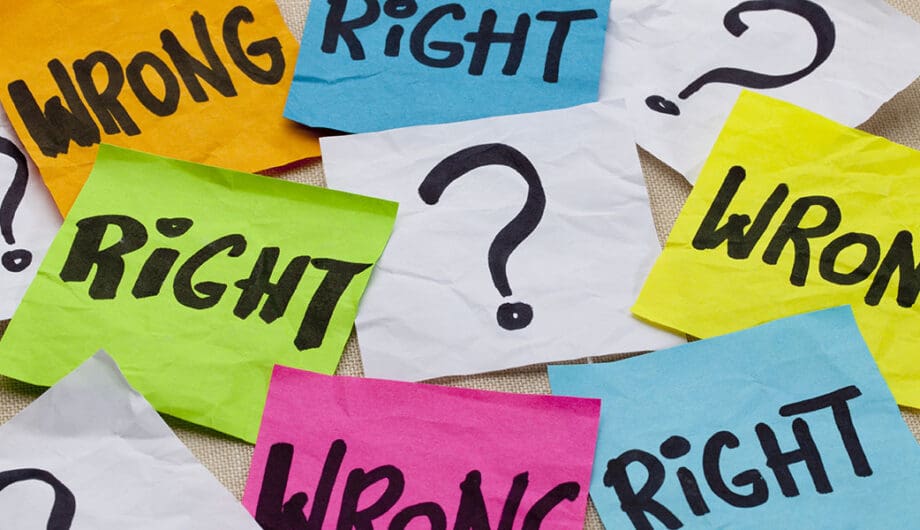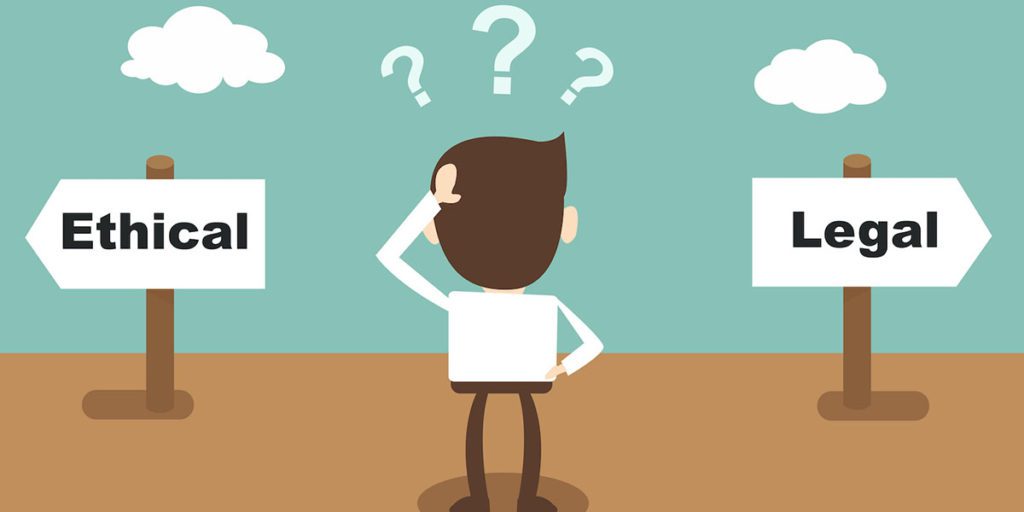
Being online now is more challenging than ever. There are so many different places you can post content. Aside from posting on your website or blog, you can also post on so many different social media outlets. Facebook, Twitter, Instagram, LinkedIn to name a few, but then within those places there are more and more places – public and private groups, business pages, direct messages. And let’s not forget communication venues like Slack, Zoom, etc.
You may think there isn’t anything to know about ethics when it comes to your online communications, but I would venture there’s a lot we all need to understand, both personally and professionally. There are different ethical boundaries about posting on different platforms that can come back to bite you if you aren’t aware of the unwritten rules.

Your Website or Blog
So let’s talk about posting online to your own website or blog and what ethics you should consider. There are a lot of variables that most people aren’t thinking about, but I would recommend you do put some thought into this for either your personal or professional website.
First, consider your audience and your online goals. If you have a business website, then your content should be business related. Posting about other topics may or may not be unethical, but wouldn’t be advised. Here are a couple of different scenarios.
You have a professional website but you want to write about your family or traditions. That wouldn’t be unethical, but if you can’t tie it into your business somehow, then it’s probably not a good idea. (And there are times when you can tie stories about your family/friends into a professional website, for sure.) However, just posting a photo of your dog on your restaurant website may not be a good idea, professionally, even if it’s not unethical.
But what about posting other things to your professional website? For example, political posts are generally a bad idea unless you are a politician.
What about writing on your website information that includes other people’s information? This is when the ethics questions really come into play.
It’s generally not ethical to publish someone’s name, photo, or information on your website unless they have given you explicit permission to do that.
Let me give some different scenarios to put this into context.
Say you’d like to share information about a public meeting that has happened, and it is relevant to your professional website and your goals. What is okay to share and not share on your own website?
Is it okay to share names/information from that meeting?
It is ethical to publish the names/actions/information of public officials from such a meeting. For example, quotes from the mayor, council member, board member, etc – basically any public figure who is a part of the public meeting, those are fair game.
What about members of the public who are speaking at the meeting?
This is a trickier scenario, and one I would caution against. While not illegal, a private citizen that comes to the public meeting to voice a concern to their publicly elected officials may not consent to their name/quotes being used on your website. I would say you would be legally in the green but ethically in yellow. Some will argue that by virtue of showing up and speaking, they have given consent, but I disagree. I’m of the “consent should not be implied” mindset. Always ask permission if you are unsure.
What about information at the meeting about personnel/staff?
My advice here is that you should not post names/information of these people without their permission, especially if they were not present at the meeting. Personnel decisions often have to be approved at public meetings, but the actual people employed may not consent to having their information on your website by virtue of having a job in a government office or school. On this, I would say you are legally in the green, but ethically in red.
Of course, if you are a journalist reporting on a public meeting, these rules are going to be different, but as a private business owner or on a personal website or even social media, those are the rules I would follow.
So what about social media posts? Can you share posts that someone else has posted on social media on your website or blog?
Can you screenshot and share social media posts from other people on your website?
I always advise against taking screenshots of things anyone else has posted online, and definitely against posting them online on your own website or social media accounts without their express permission. (Not to mention that screenshots can easily be altered, let me know if you want me to create a Tweet @ you from your favorite celebrity.)

What about a public official?
If you want to share a public social media post from a public figure, the best way to do it is to use the “share” or “embed” option, rather than a screenshot. If you screenshot it, and they take it down, it won’t come down off your website. In my opinion, public figure or not, if someone removes a social media post, that’s because they no longer want it up and that includes on your website.
What about just a regular person who posts something on a public social media account?
There are a lot of variables to consider, but the best rule of thumb is not to post it on your website without their permission. Just because they consented to publishing that information on their own social channel, that doesn’t mean they consented to having it published on your website, even if their social account is set to public.
What about retweets?
Retweets are fine, because if the person deletes their tweet, it is also eliminated from the retweet, and it’s posted on the same platform where they posted it publicly. Double thumbs-up if they ask for shares/retweets/likes.
What about posts people have shared in private forums or groups?
If you are a member of a group or forum where people have gated conversations, such as Slack channels, private Facebook groups, etc., then my advice is that you should never share or screenshot anything anyone posts without their permission. That includes sharing it either on your website or on social media, private or public. The person who posted had an intended audience for that post, and it was in a private setting of their choice. If you share it in other forums, either public or private, that is a violation of their privacy and very unethical. If you like what someone has to say and you really want to share it in another place, you should ask them first.
Direct Messages/Text Messages
My opinion on sharing direct messages/text messages on your website or social media accounts:
DON’T DO IT.
And here’s why it’s unethical. If someone sends you a direct message or a text, the intended audience for that message is YOU. It’s not your customers or clients. It’s not your Facebook friends. It’s you. Posting it online without their consent is a violation of their privacy.
However, there are some exceptions. If that communication is breaking a law, if a person is threatening to harm themselves or others, or if the message is harassment, then of course you may need to take additional steps which could include sharing that conversation with others.
What if they give permission?
As always, if you have their permission, then you are free to post/share it anywhere they are okay with.
Emails
Is it unethical to share emails you receive online? The answer to this is… sometimes.
What if your friend/family/colleague/client sends you an email you want to share?
I would consider that off-limits unless they say otherwise, simply because the intended recipient for that communication was you, and not the world.
What if you received an email from a company or business that includes a “Share” or “Forward” link?
Then you are free to share and forward, but you would likely not be free to post that message directly onto your website without explicit permission.
Reviews/Testimonials

If you have asked someone for a testimonial to share on your website and social media, and they send you that, then of course, you may use it in that capacity. (Check out our testimonials page!) That’s absolutely the best way to get reviews and testimonials online. However, if someone sends you a glowing email about how much they appreciated your service, you should NOT post that online without asking their permission first. Sometimes people just want you to know they appreciate you, without having their name put on your website or shared on social media. Consent is key.
What about reviews on third-party sites, like Google, Yelp, or Amazon?
This is actually a question that comes up a lot. If someone leaves you a review on Google or some other site, can you post that on your website? The answer is: maybe.
You cannot screenshot that review and share it on your website or social media. That could be a copyright violation, and trust me, you don’t want to find yourself in a copyright battle with any of these big organizations.
However, if one of your clients leaves you a positive review on a third-party site, you can always ask them if you can repost the same review (not a screenshot) on your website or on social media. If they say okay, then you are in the clear.

Laws vs. Ethics
Most of the time, if I get into debates about online ethics with people, their response (if they disagree) is that it’s not illegal. I would definitely be the first to argue that just because something is legal does not mean it’s ethical. Laws are created generally to keep communities and people safe – from each other, from government, from companies. Ethics is a branch of moral philosophy to help guide human conduct, which affects our relationships with each other. These are two different things.
Here’s an example. In some places, it’s completely legal for a homeowner to set up a drainage system that drains water away from their house and ultimately sends that water onto their neighbor’s property. In this scenario, the homeowner is doing nothing illegal. But we can probably all agree that it’s not ethical. (And there’s definitely a case to be made that it should be illegal, but I’m a website-maker not a lawmaker.)
In a world where nothing you send digitally is ever really gone, if we all take steps to better respect each other’s privacy, our online world will be a better place for everyone.
Amy Masson
Amy is the co-owner, developer, and website strategist for Sumy Designs. She's been making websites with WordPress since 2006 and is passionate about making sure websites are as functional as they are beautiful.
